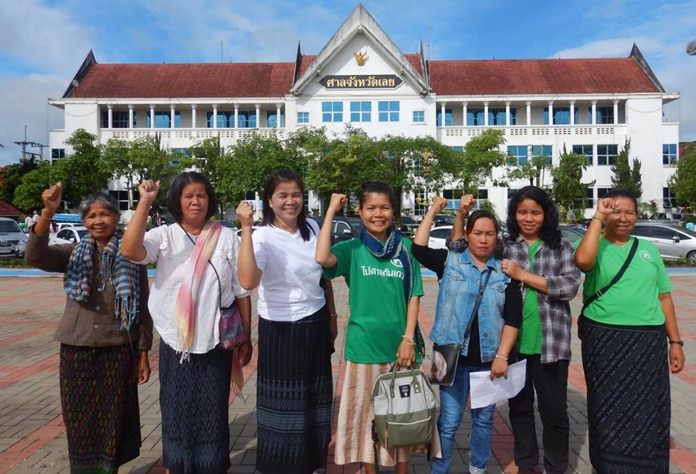
Bangkok (AP) — A court hearing found seven environmental activists not guilty Thursday of violating a law on public gatherings that imposes severe penalties for actions that disrupt public services.
 The activists, all women, in November 2016 blocked access to a meeting at a local government office in Loei province in Thailand’s northeast to protest a request by a gold mining company to expand operations near their homes. They were charged by prosecutors on behalf of 16 people who said they were unable to attend the scheduled meeting due to the 20-hour protest.
The activists, all women, in November 2016 blocked access to a meeting at a local government office in Loei province in Thailand’s northeast to protest a request by a gold mining company to expand operations near their homes. They were charged by prosecutors on behalf of 16 people who said they were unable to attend the scheduled meeting due to the 20-hour protest.
The Loei Provincial Court dropped all charges against them, stating they had “innocently expressed their opinions, which is within their basic rights under the system of democracy.” They had also been charged with compelling a person, by threat or violence, to act against his will. Had they been convicted they could have faced more than five years in prison.
The court also stated that the defendants lived in the area of the Tungkum Ltd. gold mine and thus their livelihoods were directly affected by the mining operations, which they said contaminated public water sources with dust, heavy metals, rat poison and high levels of manganese.
Villagers had been protesting since 2006 against the mine’s alleged pollution and had blocked the company’s trucks from the road leading to the mine’s entrance at least three times since 2013. On one of those occasions in 2014 they were attacked and beaten at night by about 200 armed men. Two military men were convicted and jailed for orchestrating the assault.
Tungkum has brought at least 19 criminal and civil complaints against 33 Loei residents since 2007.
The company’s license to operate in forest areas expired about five years ago, curtailing most of its operation.
Pornthip Hongchai, one of the acquitted defendants, said she was “satisfied and happy” with the court’s ruling. She was worried, however, that a new mining law might allow operations to resume, and that nothing had been done to deal with the residual pollution.
“There is still contamination within our six villages surrounding the mine. No officials or any department have come to seriously fix or address the problem yet. Villagers know that the water is contaminated and we have to be careful and look after ourselves. We still have to buy water to drink and cook with. We’ve been buying water since 2009 when there was a public health announcement.”
In December 2016, Prime Minister Prayuth Chan-ocha issued an executive order halting all gold mining in Thailand.
However, the order also mandated creation of a committee to manage and oversee the country’s mineral resources, with power to allow gold mining to resume at a later date.





